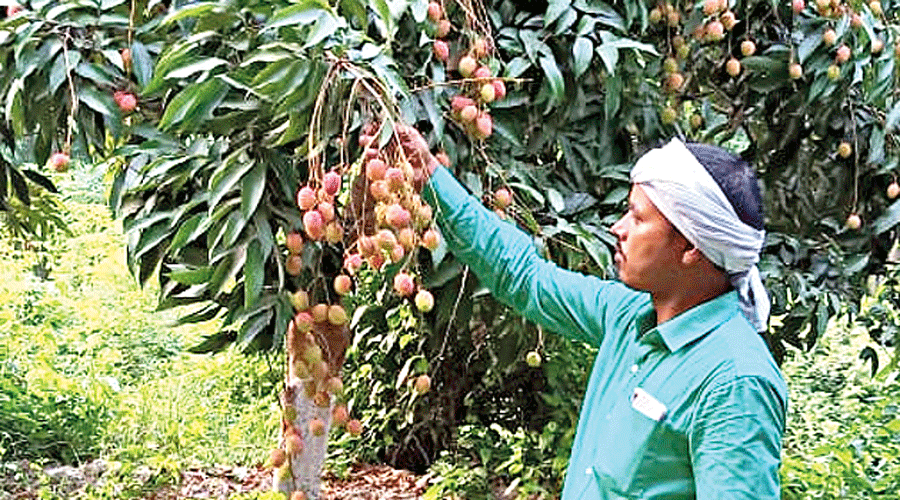The whole country is privy to how Prime Minister Narendra Modi enjoys his mangoes but not much is known about his opinion on litchis, or the many problems that ail the farmers cultivating the fruit.
When the Prime Minister and the President tuck into the sweet and succulent Shahi litchis from Bihar’s Muzaffarpur this year, farmers want them to take note of their bitter plight and initiate steps to alleviate their miseries.
On Friday as the Bihar government dispatched the choicest of litchis from Muzaffarpur as gifts for President Ram Nath Kovind, Prime Minister Modi, Chief Justice of India N.V. Ramana and other dignitaries in the national capital, farmers rued the exploitation they face at the hands of middlemen. They appealed to the VVIPs, who are sent litchis every year as a ritual, to think about them when they eat the fruits this time and do something to improve their lot and income.
Muzaffarpur district is famous for the Shahi litchi variety, known for its sweetness, subtle rosy fragrance, taste, extra-juicy pulp and small seeds. It was given the Geographical Indication tag in 2018.
“We are sending 1,250 boxes of Shahi litchis, each containing 2kg of fruits, to Bihar Bhavan in New Delhi today. The boxes will be sent from there to dignitaries including the President and the Prime Minister,” Muzaffarpur district magistrate Pranav Kumar told The Telegraph.
The litchis have been procured from orchards taken on contract by entrepreneur Alok Kedia, who has a fruit pulp-processing unit that exports litchi pulp to Canada, the US and European countries. The Bihar government has also entrusted Kedia with the responsibility of packaging and transporting the consignment.
“We have selected good-sized litchis, each weighing at least 25 grams. Special care has been taken to ascertain that they are free of pests or disease. They have been packed in cardboard boxes and will be transported in a refrigerator container truck. The vehicle will leave tonight and reach Delhi in two days,” Kedia told this newspaper.
However, the litchi farmers are unhappy about their condition and blame the central and state governments for their plight.
“The President, Prime Minister and the other dignitaries will taste the litchis, shower praise on them and then forget about us. We appeal to them to remember the cultivators when they eat the fruits this time and do something to alleviate their pitiable condition,” Bholanath Jha, a top litchi producer in Muzaffarpur, told this newspaper.
“Litchi is a popular fruit among consumers and a cash crop for farmers big and small. Our main problem is exploitation by wholesale businessmen and their middlemen. Litchis are currently selling at Rs 150 to Rs 200 a kilo in the retail markets of Delhi, Mumbai and other metros but its producers get just Rs 10 to Rs 12 per kilo and are forced to lead a hand-to-mouth existence,” Jha added.
The Bihar government does not procure litchis directly from farmers, leaving them at the mercy of middlemen.
Once a driving force of the now-defunct Litchi Growers’ Association in Bihar, Jha asserted that the government had done nothing to save the farmers from exploitation by conduits.
“Bihar is the largest producer of litchi in the country but the government has not established even a single sale or trading point for it. It has not provided adequate infrastructure support to the farmers for prolonging the shelf life of litchis and their transport. To top it all, the government never paid attention to installing proper water drainage facilities, because of which thousands of litchi trees were destroyed in the floods last year and the waterlogging that followed,” he said.
The farmers pointed out that there had been no worthwhile research by government agencies to increase the shelf life of litchis, which usually begin to go bad after a couple of days if not kept in a cold storage or treated with chemicals. Farmers cannot afford to keep their produce in the private cold stores in the absence of government help.
Litchi is cultivated on 98,000 hectares in India with the annual production being 7.25 lakh tonnes in 2020-21. Of this, Bihar accounts for around 34,000 hectares and produces around 3 lakh tonnes annually. Apart from Shahi, the other prominent litchi varieties cultivated in the country are Purbi, Swarna Roopa, Kasba, China, Elaichi, Early Seedless, Bombay, Calcutta, Dehradun, Gulabi, Mandraji and Ajhauli.
The Indian Council of Agricultural Research’s National Research Centre on Litchi (NRCL) is based in Muzaffarpur. NRCL director Sheshdhar Pandey highlighted the problems associated with litchi farming.
“The shelf life is poor. Browning of the outer skin starts after 48 hours if left untreated or not kept in cold storages. Farmers, instead of plucking early morning, do it in the sun, which expedites deterioration. The fruit is susceptible to harsh weather and rain when the crop is ready. However, this time the weather has been helpful and the production has been good,” Pandey told this correspondent.
The director said the NRCL had nothing to do with the marketing or transportation of litchis, but said that proper cargo facilities, including airlifting and refrigerated vehicles, would help the farmers sell their crop.











